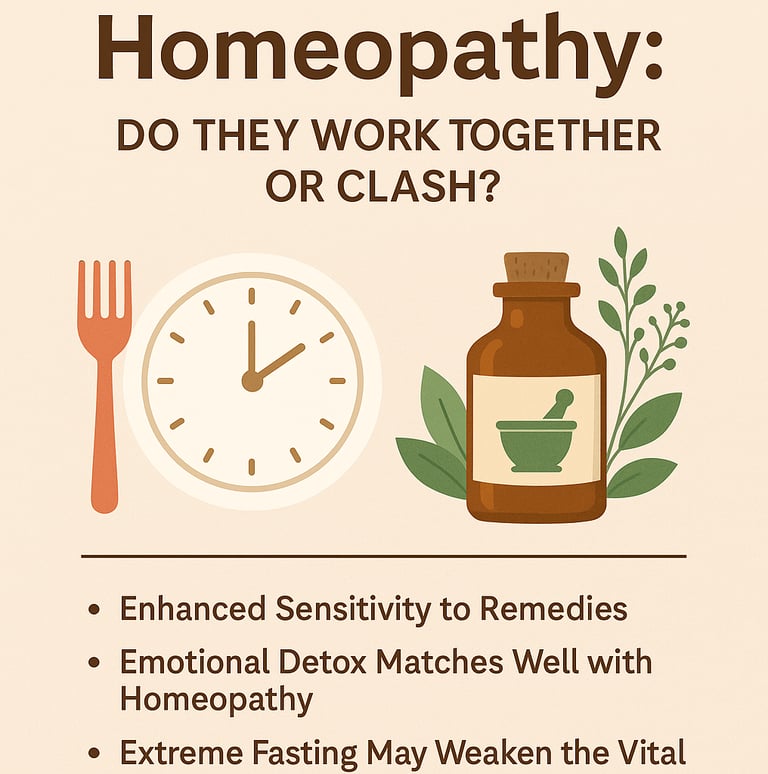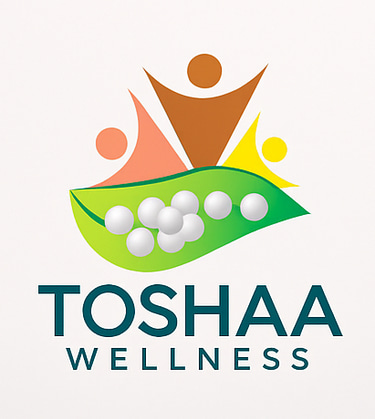The Harmony Between Fasting and Homeopathy: A Holistic Perspective


In recent years, both fasting and homeopathy have gained renewed attention as holistic approaches to health and healing. While one focuses on nutritional discipline and detoxification, the other is a finely tuned system of natural medicine that works on the principle of "like cures like." But an important question often arises among my patients:
Can fasting and homeopathy work together—or do they interfere with each other?
Let’s explore the synergy (or potential conflict) between these two healing modalities.
🌿 Understanding Fasting: More Than Just Skipping Meals
Fasting, when done mindfully and under guidance, is not merely abstaining from food. It’s a metabolic reset—a practice that supports the body’s innate ability to heal, detoxify, and rejuvenate. There are many types of fasting:
Intermittent fasting (time-restricted eating)
Water fasting
Juice fasting
Religious/spiritual fasts like those seen in Ayurveda or during festivals
When practiced correctly, fasting has been shown to:
Improve insulin sensitivity
Promote cellular repair (autophagy)
Reduce inflammation
Enhance mental clarity
Support gut health
From a holistic standpoint, fasting helps bring the mind and body into harmony, which aligns beautifully with the philosophy of homeopathy.
⚗️ Homeopathy: Healing the Whole Person
Homeopathy is based on treating the individual as a whole—not just the symptoms of disease. Remedies are prescribed after carefully understanding the patient’s physical, emotional, and mental symptoms. These ultra-diluted medicines stimulate the body’s vital force, supporting its natural ability to heal.
But homeopathy is sensitive—its remedies are subtle energies that interact with our body's vital force. Hence, questions about fasting affecting remedy absorption are valid and worth exploring.
🤝 Do They Work Together? Absolutely—With Awareness.
Here’s how fasting and homeopathy can complement one another:
✅ 1. Enhanced Sensitivity to Remedies
When fasting, the body is in a more receptive and detoxified state, which can actually enhance the action of homeopathic remedies. In my clinical experience, patients on short therapeutic fasts often report faster responses to remedies, clearer symptom expressions, and a deeper healing process.
✅ 2. Emotional Detox Matches Well with Homeopathy
Fasting doesn't just cleanse the body—it often brings up emotional or mental states (like anxiety, irritability, or grief). These emotional shifts are important indicators in homeopathic prescribing. They help us select the most suitable remedy (the simillimum) at the right time.
✅ 3. Shared Philosophical Roots
Both fasting and homeopathy believe in working with the body, not against it. They promote natural healing, balance, and minimal intervention—making them philosophically aligned.
⚠️ Where Caution Is Needed
While fasting and homeopathy usually work well together, there are some considerations to keep in mind:
⚠️ 1. Extreme Fasting May Weaken the Vital Force
Homeopathy works by stimulating the vital force. If fasting is too prolonged or harsh—especially in already weak or chronically ill patients—it can deplete vitality, making it harder for remedies to act.
My advice: Always consult a practitioner before beginning a long fast if you're undergoing homeopathic treatment for chronic conditions.
⚠️ 2. Remedy Absorption and Fasting
Some remedies are sensitive to substances like strong coffee, mint, or camphor, which are sometimes used during fasting rituals (like herbal teas or balms). These can antidote the remedy.
Solution: Inform your homeopath about your fasting routine so remedies can be timed or adjusted accordingly.
⚠️ 3. Symptom Overlap
Fasting can bring about temporary symptoms like:
Headaches
Dizziness
Mood swings
Mild digestive issues
These may mimic or mask your actual symptoms. Hence, timing remedy prescriptions around fasting periods requires care.
💡 Tips for Combining Fasting and Homeopathy Successfully
Stay Hydrated: Water supports both detoxification and remedy action.
Inform Your Doctor: Always tell your homeopath if you’re fasting—type, duration, and purpose.
Avoid Strong Aromatics: During remedy dosing, avoid essential oils or strong-smelling substances.
Listen to Your Body: If you feel extremely weak, discontinue fasting and prioritize recovery.
Opt for Gentle Fasts: Intermittent or light mono-diets (like khichdi or fruit) work well alongside homeopathy.
🌸 A Case Study from My Practice
A 34-year-old woman with PCOS and irregular periods began homeopathic treatment. She also practiced intermittent fasting (16:8) for metabolic health. Her body responded remarkably—her cycles regulated within 3 months, and acne reduced significantly.
Interestingly, during fasting, her mental state became clearer, which helped refine her remedy selection. The synergy between both approaches was evident in her sustained improvement.
🌈 Conclusion: Harmony Over Conflict
When used mindfully, fasting and homeopathy are not adversaries—they are allies. Both respect the body’s wisdom, work gently, and aim for long-term healing rather than quick fixes.
As a homeopath, I encourage patients to explore fasting—with awareness and balance, never as punishment or extremism. When tailored correctly, fasting can enhance homeopathic healing, deepen self-awareness, and support true wellness from within.
Have questions or want to know if fasting is right for your homeopathic journey?
Feel free to consult—I’d be happy to guide you holistically.
